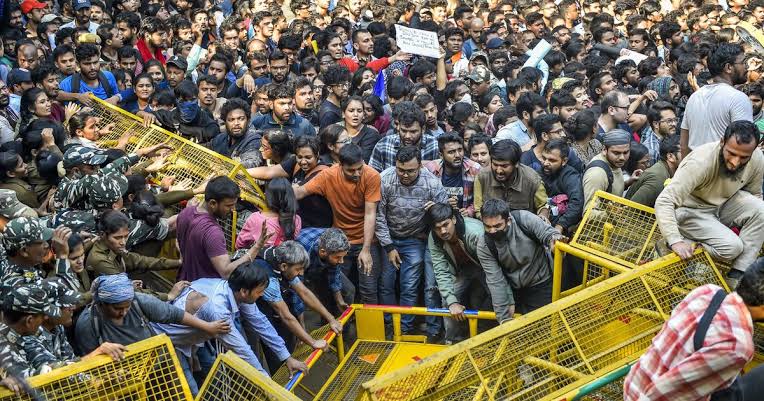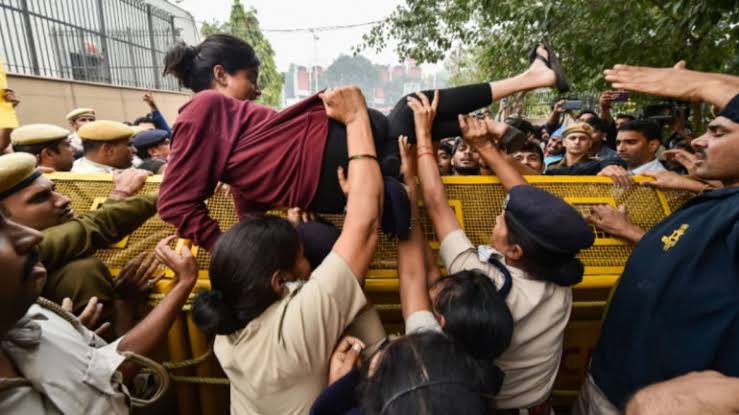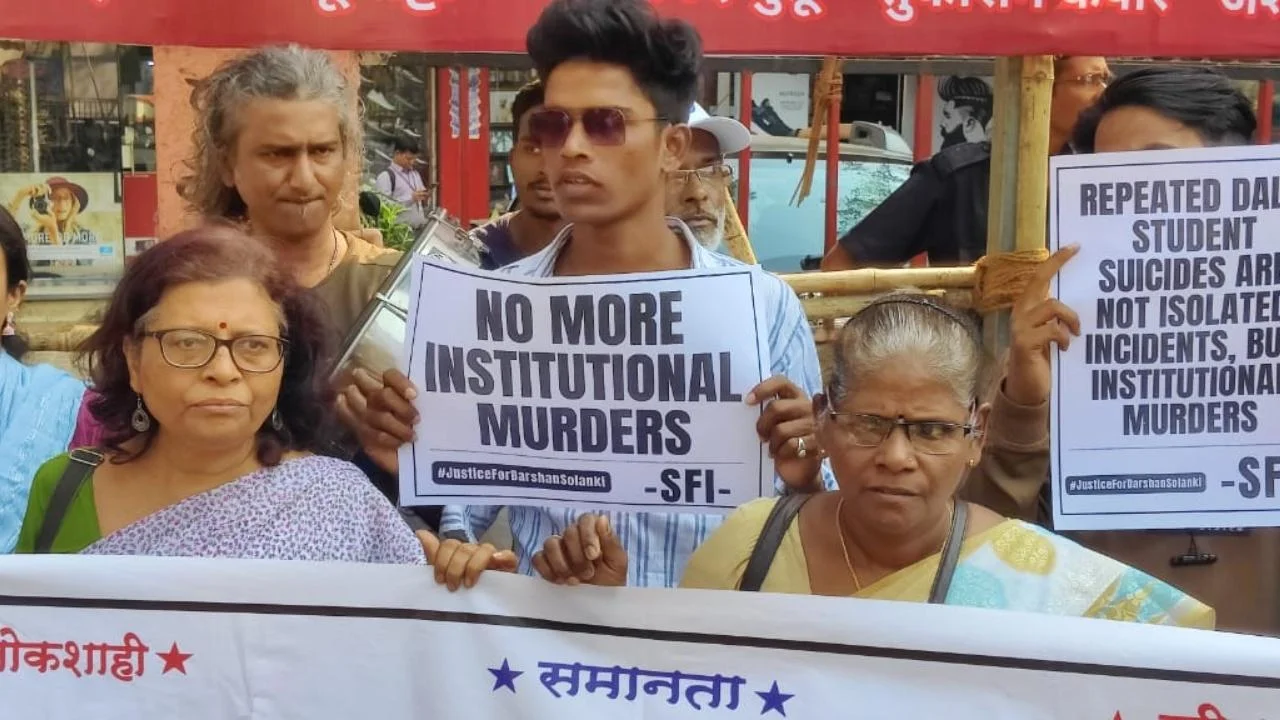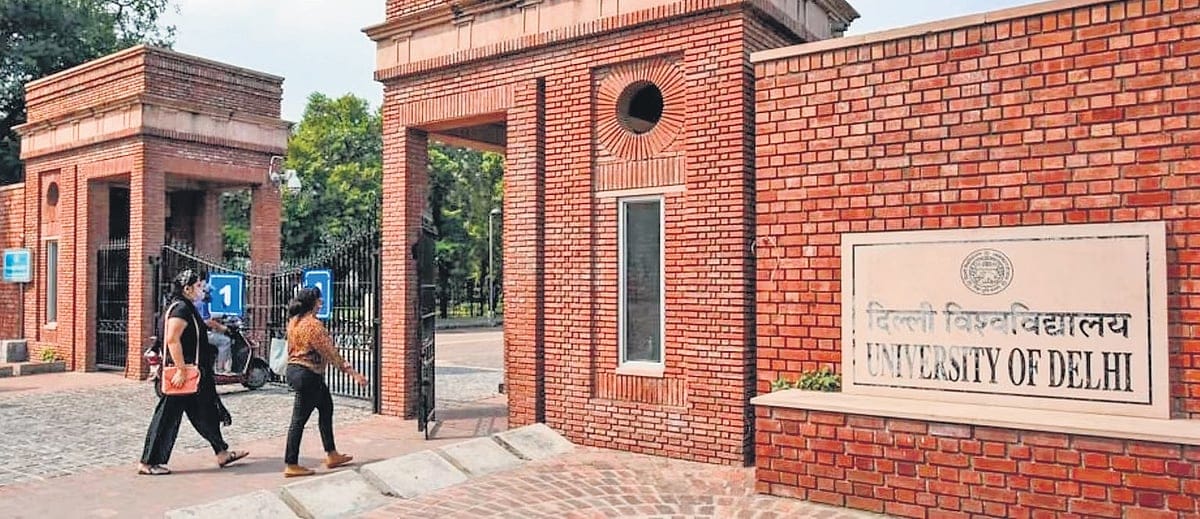On 18th November, more than three thousand students of the Jawaharlal Nehru University (JNU) set out on a long march to the locus of the political activities in India—the Parliament—in New Delhi. The walk spanned a distance of almost fourteen kilometers, which the students aimed to undertake on foot. Permission for this walk was not granted to students; in fact, while the walk was scheduled to commence at ten in the morning, it eventually started after half past eleven because there was a rumour doing the rounds that the Ministry of Human Resource Development had permitted the students for the walk, but that the notice for the same would only come at 11:30 am.
What actually arrived in place of the notice was the information that a three-member high power committee had been instated to look into the issues being faced by the students of the university. However, this tactic did not fit in with the students, and we set out on the march. After a long and exhausting walk, which also involved being chased by the Delhi police at different stages, the students camped at Jor Bagh, beyond which the police would not let us go (they were probably “scared” that unarmed students would “vandalise” the residence of the Home Minister, who lives close by).
After a long day, just when traffic had slowly started flowing around the area, the police switched off the street lamps and proceeded to lathi charge the students. The students started running in the dark, amidst cars which had now stopped, creating a stampede like situation. Several students were grievously injured, during the ordeal that was the entire day.
With a total of 2088 women students staying in hostels, it provides a sense of independence for them. Such a high number of female students in women hostels which are higher in number than hostels for men give a sense of the ideals this university aimed to run by.
Why Were Several Thousand Students Out On The Streets In Protest?
About three weeks ago, the JNU administration proposed changes in the hostel manual for students living on campus, asking them to now pay fees increased by 300% of the older fees (the rooms which were available for INR 10 a month, are going to become INR 600 a month, for instance). Along with this, the hostel manual also suggested a dress code for hostellers, and introduced curfew timings for the hostels. JNU, which was ranked second on the list of best universities in India by the National Institute of Ranking Framework (NIRF) in 2019 would, after the fee hike become the most expensive among the 49 central universities in India.
Up until now, JNU has made education accessible for a large demographic of students from varied backgrounds and locations – 40% of its student body comprise of students who belong to households with a annual income of 1.44 lacs and 26% with a annual income of 70k.

After two weeks of agitation, at the Executive Committee meeting of JNU last week, the proposed hostel manual was passed with a decrease in the fee hike: there will now be a separate category introduced in the manual under the subheading of BPL or Below Poverty Line. This category provided a 50% exemption to students included here. For some reference, the qualification for the BPL category in India is an annual income of 27k, which amounts to INR 2.3k per month.
But this is a bare-minimum category in a sense, because families which earn 70k per annum have a monthly income of 5.8k INR. With the increase in fee hike, they will now have to pay close to 6k per month – how will these students afford it? The scholarships provided by the University Grants Commission for non NET scholars are 5k and 8k for MPhil and PhD students respectively, and these haven’t increased in years, not to mention that they often do not come in on time.
Up until now, JNU has made education accessible for a large demographic of students from varied backgrounds and locations – 40% of its student body comprise of students who belong to households with a annual income of 1.44 lacs and 26% with a annual income of 70k.
The Feminist Perspective Of The Protests
In a country where discrimination has historically existed against women, sexual minorities and Persons with Disabilities, JNU has remained a space which not only provides accessible and inexpensive education but also a space of mobility and freedom of expression. Out of the approximately 7000 students enrolled in JNU, almost 5000 live in hostels. With a total of 2088 women students staying in hostels, it provides a sense of independence for them. Such a high number of female students in women hostels which are higher in number than hostels for men give a sense of the ideals this university aimed to run by.
With this increase in fee hike, there will be a dilution of those ideals, to now only include students from the upper echelons of the society. Now hostels will be used by only certain creamy sections of the population, which will translate into lesser education opportunities for students, as they might stop applying to this university. Who then will be the producers of knowledge is a question we must ask. Education is one of the most lucrative investments of the state, with varied returns in different forms; privatizing this education will benefit very few.
Now families who could afford to send both sons and daughters to study, will only be able to send one, or want to spend such money on only the men. The ratio of female to male students in the university will decrease. If this translates into a tussle between men and women for education, no prizes for guessing who will win that tussle. If under such circumstances students cannot even peacefully protest against the injustice meted out under the current political regime, if they cannot turn to the law for the help, then who is the law benefiting?
Now families who could afford to send both sons and daughters to study, will only be able to send one, or want to spend such money on only the men. The ratio of female to male students in the university will decrease.
An Appeal For Solidarity
This year JNU also introduced digitally conducted examinations for students. In one such digitally conducted examination that I have previously sat for, I struck up a conversation with a fellow examinee, who told me she was afraid that she wouldn’t be able to remember which key to press on the computer for her answers, because she had only ever used computers for the examinations. She didn’t own a computer to practice upon.
The aim of all this seems to be the inaccessibility of education – filtering out aspiring students at the most basic levels of access. Students, teachers and the non-teaching staff are together in this fight against privatization. The media, which one media-person reminded us at the march very righteously, is the fourth pillar of democracy. Yet, when it comes to reporting on this protest, they paint a picture of chaos and unfounded violence on the part of students.
Solidarity, instead, comes from the extended student and teacher community, as also the #feesmustfall activists of South Africa. When positioned in such trying times, I can’t help but wonder what the ultimate motive of this state is. What are the state’s priorities, apart from filing FIRs against protesting students? And what about the police-persons who beat students, when is an FIR going to be filed against them, and all those who are abetting this?
Also read: Discrimination Faced By Muslim JNU Professor Hints Rising Islamophobia
The revisions in the hostel manual are being deemed as eyewash because it seems like that administration’s intent all along was the revised fees. They increased it even beyond the 300% increase initially, so that they could settle on the eventual 300%. No deprivation points have been made for students belonging to the categories of SC, ST or OBC. This seems like a drive to make education accessible to a select section of the Indian population.
The fact that the university could provide such inexpensive education to such a varied population of students should have been a matter of pride for our country, yet the picture that has been painted now is of a body of unruly students who are fighting for no real reason. These unruly students have to be brought to the books, which is why tear gases and lathi charges are acceptable to the government in controlling them. The long march was to be a peaceful protest, with students demonstrating against this revoking of their access to education.
Also read: JNU Fee Hike: Why Does The Right-Wing Twitterati Want To #ShutDownJNU ?
Our Constitution provides us this right – to dissent, and to demonstrate – but, the government used force and weapons to curb this right. If the JNU administration truly believes in the changes made in the hostel manual, why are they so reluctant to meet the students and initiate a conversation with them? It has been three weeks since the students have been agitating against this, and trying to get the attention of the Vice Chancellor, but he has not spoken to the students directly even once (his Twitter account is very active, though). Remind anyone of the zero press conferences held by the Prime Minister of India during his long reign in that position? There seems to be a pattern to this.
Featured Image Source: India Today
About the author(s)
Himalika is slowly beginning to get the hang of being an adult, despite being a bad cook. She will take most things with a sense of humour and is constantly striving to infuse feminist practices in her research.




